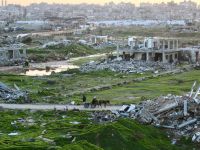A UN technical team will visit Baghdad in mid-February for talks on how to manage 600 million euros ($564 million) allocated for the rehabilitation of Iraq's oil industry, Oil Minister Amer Rashid was quoted as saying Tuesday.
Quoted by Al-Jumhuriya newspaper, Rashid said his ministry would show the UN mission "projects to finance locally so as to favour free management of funds allocated for the development of our oil industry."
Whilst extending the latest six-month stage of the oil-for-food programme last month, the UN Security Council agreed to release up to 600 million euros of Iraq's oil income in cash to train and pay maintenance workers in Iraq's dilapidated oil industry.
The council asked Annan to ensure the money was not diverted by the Baghdad regime for other purposes.
The move would allow President Saddam Hussein's regime to manage for the first time a small part of its oil revenues from the tightly controlled UN account in New York.
Rashid did not mention training or pay but said Iraq had "some future projects for enlarging and developing its export terminals."
Among these projects were maintenance on the oil pipelines linking Iraq to Turkey and Syria as well as the construction of another pipeline between Iraq and Jordan.
The only current legal outlets for Iraqi oil sales, which are strictly supervised under UN sanctions imposed after the August 1990 invasion of Kuwait, are the Gulf port of Mina al-Bakr and the Turkish port of Ceyhan.
It has been reported that Syria began to receive Iraqi crude oil on November 20 through a pipeline that had been closed for 18 years, but neither Damascus nor Baghdad have confirmed this.
Jordan, which depends on Iraq for all its oil, formed a committee earlier this month tasked with paving the way for the construction of a pipeline to carry Iraqi oil to the kingdom.
Iraq's December exports under the UN oil-for-food programme averaged 600,000 bpd, compared with 2.1 million bpd in November and 2.36 million bpd in October, the Middle East Economic Survey (MEES) reported Monday.
Exports in January could be even lower than December, MEES said. Only 548,000 bpd have been confirmed so far.
Current capacity in Iraq is no more than 2.8 million bpd, it said, adding that there was no early expansion in prospect.—AFP.
©--Agence France Presse 2001.
© 2001 Mena Report (www.menareport.com)






